Personnel Note: Retired Rear Admiral Kent Davis named head of Alabama VA

On Thursday, Governor Kay Ivey announced her selection of Alabama native Rear Admiral W. Kent Davis as commissioner of the Alabama Department of Veterans Affairs. On January 4, the State Board of Veterans Affairs voted on this selection before today’s official offer. In a press release, Ivey said “After serving his country in multiple branches of the military over the course of his distinguished career, Adm. Davis has proven himself as an excellent selection to serve as the next commissioner of the Alabama Department of Veterans Affairs. I commend the hard work of the State Board of Veterans Affairs Search Committee for recommending our next VA leader. I know that Adm. Davis will take his broad spectrum of experience and apply it well to help the honorable men and women of Alabama who have so proudly served in uniform.” According to the press release, Adm. Davis served in both the U.S. Army and U.S. Navy in active duty but, in his 30 years in uniform and 11 years of active duty, has experience with all military services. Adm. Davis, it says “Adm. Davis is one of only a few people who has served both as a field grade officer in the Army and a senior officer in the Navy.” In addition, he has a Bachelor of Science in Business Administration from Louisiana State University and his law degree from Georgia State University. AL.com reports that Adm. Davis began his career as an officer aboard the U.S.S. Missouri in 1986 and retired from the Navy in October of 2016. He has also worked as city manager for Anniston, deputy superintendent of the U.S. Department of Homeland Security’s Center for Domestic Preparedness (CDP)in Anniston, director of public affairs for U.S. detention operations in Afghanistan. He is currently chief communication officer at Air University at Maxwell Air Force Base in Montgomery. In the press release, Adm. Davis was quoted as saying, “I look forward to continuing to serve my country as the commissioner of the Alabama Department of Veterans Affairs. As a veteran myself, I understand the importance of providing help to the hundreds of thousands of Alabamians who have served in uniform,” Adm. Davis said. “It is an honor to have been chosen for this new post. I appreciate the confidence in me shown by Governor Ivey and the State Board of Veterans Affairs. I will work hard each day to ensure the veterans of Alabama are treated with the utmost respect and granted the care they so greatly deserve.” Adm. Davis told the Anniston Star that he left his position at CDP in Anniston under pressure after trying to address serious problems. “I had to walk away from that,” Davis said. “I thought, do I stay and fight this out with all the risks, or do I walk away knowing that if I resign it ends everything?” In 2017, the Alabama Department of Veterans Affairs earned national recognition for a website that improves veterans’ access to VA benefits and services.
VA announces grant for Alabama State Veterans Memorial Cemetery at Spanish Fort

The Department of Veterans Affairs (VA) National Cemetery Association (NCA) on Wednesday announced it has awarded the state of Alabama a grant in the amount of $274,393 for the expansion and improvement of the Alabama State Veterans Memorial Cemetery at Spanish Fort. “Our state and tribal partners are critical in helping NCA achieve our strategic goal of providing 95 percent of the Veteran population with convenient access to a burial option within 75 miles of the home,” said Under Secretary for Memorial Affairs Randy Reeves. “We look forward to continuing to work with states like Alabama and provide grants that reflect the needs, resources and preferences of the local Veteran community.” The grant will fund the construction of 430 in-ground cremains gravesite, a memorial wall containing 100 plaques, widened cortege lane, landscape, irrigation and supporting infrastructure. The project will develop approximately 0.5 acres and provide continued service for approximately 56,000 Veterans, spouses and eligible family members. “Great news! The Department of Veterans Affairs has awarded a $274,000 grant for the expansion and improvements to the Alabama State Veterans Memorial Cemetery in Spanish Fort,” Alabama 1st District U.S. Rep. Bradley Byrne posted on Facebook of the news. “This is excellent news for our local veterans and the entire community.” The closest national or state Veterans cemetery to Spanish Fort is Barrancas National Cemetery in Pensacola, Fla. approximately 57 miles away.
Donald Trump’s pick to head Veterans Affairs: Robert Wilkie
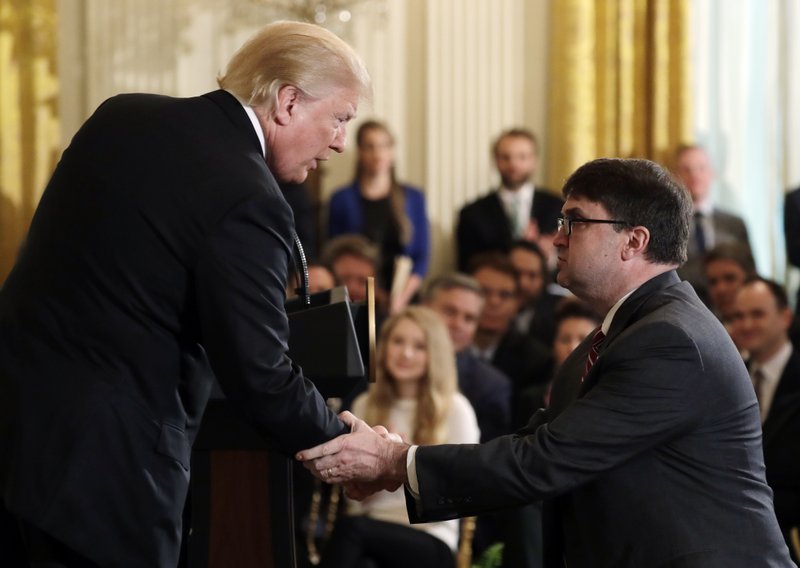
President Donald Trump announced Friday he is nominating Acting Veterans Affairs Secretary Robert Wilkie to permanently lead the beleaguered department. Wilkie, a former Pentagon undersecretary for personnel and readiness, has led the agency since Trump fired David Shulkin two months ago amid an ethics scandal and mounting rebellion within the department. Trump revealed his decision during a prison reform event at the White House, and said the decision was a surprise to Wilkie. “He doesn’t know this yet — that we’re going to be putting his name up for nomination to be secretary of the veterans’ administration,” Trump said. Trump previously nominated White House physician Dr. Ronny Jackson for the job, but he withdrew last month. Wilkie, 56, oversaw a new Pentagon policy aimed at stemming harassment in the military after an online nude-photo sharing scandal rocked the Marine Corps. He was confirmed unanimously as Pentagon undersecretary by the Senate. As acting VA secretary, Wilkie has sought to rebuild morale at an agency beset with inner turmoil and rebellion over Trump’s push to expand private care. On Thursday, he announced a major $10 billion contract with Cerner Corp. to overhaul electronic health records for millions of veterans, a 10-year project that aims to improve mental health care and ease access to private providers. The VA faces problems demanding immediate attention, including a multibillion dollar revamp of electronic medical records, now in limbo, that members of Congress fear will prove too costly and wasteful, and a budget shortfall in the coming weeks in its private-sector Veterans Choice program. The House is slated to vote on a wide-ranging bill next week that would give veterans more freedom to see doctors outside the VA health system and fill the budget shortfall, a major step toward fulfilling Trump’s promise to expand private care for veterans. Wilkie, an Air Force and Navy veteran, had the strong backing of Defense Secretary Jim Mattis and White House chief of staff John Kelly for the VA post as a skilled manager with defense expertise, over other candidates who had more political experience, such as former Rep. Jeff Miller, who had chaired the House Veterans Affairs Committee. The son of an Army artillery commander, he spent his childhood at Fort Bragg and served under President George W. Bush as an assistant secretary of defense. He was the youngest senior leader in the department. He also served as senior adviser to Sen. Thom Tillis, R-N.C., before being named a Pentagon undersecretary in 2017. Jackson’s nomination to replace Shulkin surprised veterans groups that were unaware his name was under consideration. He was a career military doctor who lacked significant management experience. While Jackson was well-liked in Washington and drew praise from Obama administration officials he’d treated, even many Republicans were skeptical of his ability to lead the VA. After Jackson withdrew from consideration, White House officials said Trump planned to interview and vet his next nominee more thoroughly. Wilkie was among several candidates White House staff interviewed in recent weeks for the post. The president had indicated he intended to pick someone with a more political background for the role, hoping such a person would better navigate the turbulent confirmation process in a narrowly divided Senate. Wilkie has experience shepherding two defense secretaries through Senate confirmation. Republished with permission from the Associated Press.
Donald Trump’s VA choice bows out in latest Cabinet flame-out
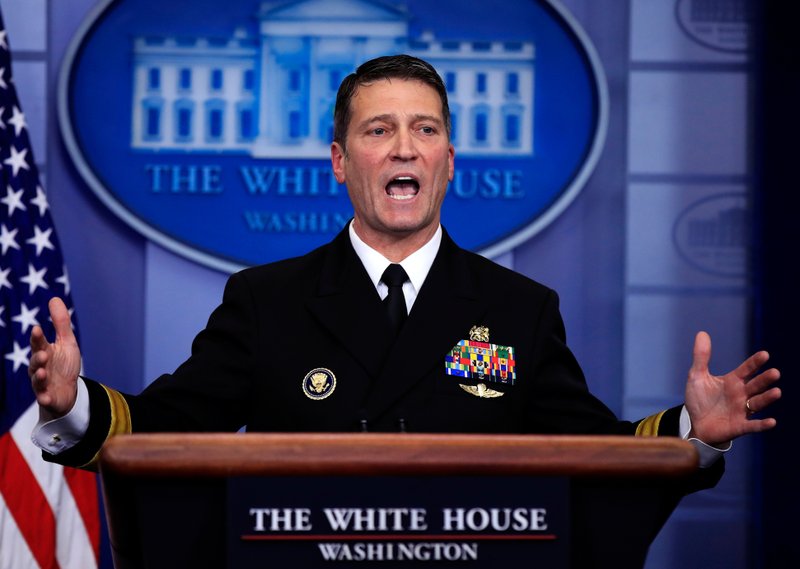
President Donald Trump’s White House doctor reluctantly withdrew his nomination to be Veterans Affairs secretary Thursday in the face of accusations of misconduct, the latest embarrassing episode highlighting Trump’s struggles to fill key jobs and the perils of his occasional spur-of-the-moment-decision-making. The weeks-long saga surrounding the nomination of Navy Dr. Ronny Jackson leaves the government’s second-largest agency without a permanent leader while it faces an immediate crisis with its private health care program. And it abruptly tarnished the reputation of a doctor beloved by two presidents and their staffs. White House officials say they are taking a new look at the way nominees’ backgrounds are checked — and they believe they will persuade Trump to take additional time to ensure that a replacement is sufficiently vetted. The leading person now under consideration for the VA post is former Rep. Jeff Miller, who chaired the House Veterans Affairs Committee before retiring last year, according to White House officials. Miller is a strong proponent of expanding private care for veterans, a Trump priority. Trump quickly selected Jackson, a rear admiral in the Navy, to head the VA last month after firing Obama appointee David Shulkin following accusations of ethical problems and a mounting rebellion within the agency. Jackson, a surprise choice who has worked as a White House physician since 2006, faced immediate questions from Republican and Democratic lawmakers as well as veterans groups about whether he had the experience to manage the massive department of 360,000 employees serving 9 million veterans. Then this week’s unconfirmed allegations by current and former colleagues about drunkenness and improper prescribing of controlled substances, compiled and released by Democrats, made the nomination all but unsalvageable. “The allegations against me are completely false and fabricated,” Jackson said in a statement announcing his withdrawal. Press secretary Sarah Huckabee Sanders said Jackson was back at work at the White House on Thursday. But his future there remains uncertain. He had stepped aside from directing Trump’s medical care and leading the medical unit while his nomination was being considered. “I would hope the White House would closely consider whether he is the best person to provide medical care for the president,” said Democratic Sen. Chris Coons of Delaware. Trump himself praised Jackson, saying, “He’s a great man, and he got treated very, very unfairly.” Then the president went after Democratic Sen. Jon Tester of Montana, who released a list of allegations against Jackson that was compiled by the Democratic staff of the Senate Veterans Affairs Committee. Trump aides said the president was furious with Tester, who faces a tough re-election fight this fall, and plans to aggressively campaign against him. “I think Jon Tester has to have a big price to pay in Montana,” Trump warned on “Fox & Friends” on TV. Tester, meanwhile, called on Congress to continue its investigation of Jackson. “I want to thank the service members who bravely spoke out over the past week. It is my constitutional responsibility to make sure the veterans of this nation get a strong, thoroughly vetted leader who will fight for them,” he said. Elsewhere in the capital, Congress was questioning another Trump official whose job appears in jeopardy. Scott Pruitt, head of the Environmental Protection Agency, was questioned closely by House Democrats about revelations of unusual security spending, first-class flights, an advantageous condo lease and more. Even Republicans who support Pruitt’s deregulation efforts, said his conduct needed scrutiny. Tom Price, Trump’s first secretary of the Department of Health and Human Services, resigned last year after criticism of his use of private charter flights and military jets. The turmoil at the VA comes as it faces a budget shortfall for its private-sector Veterans Choice program, a campaign priority of Trump’s, with lawmakers deadlocked over a long-term fix due to disagreements over cost and how much access veterans should have to private doctors Veterans are “exhausted by the unnecessary and seemingly never-ending drama,” said Paul Rieckhoff, executive director of Iraq and Afghanistan Veterans of America. “VA’s reputation is damaged, staff is demoralized, momentum is stalled and the future is shockingly unclear.” The VA issued a statement late Wednesday that it would push to have Congress move on an expansion of Choice next month. Sen. Johnny Isakson of Georgia, chairman of the Veterans Affairs Committee, said Thursday he would “work with the administration to see to it we get a VA secretary for our veterans and their families.” White House officials were visibly dismayed Wednesday and Thursday as they watched Jackson suffer the blows of the allegations. The doctor, who is well-liked by and has personal relationships with many White House staffers, cited the withering pressure for withdrawing from consideration for the post, but maintained he had done nothing wrong. Trump said on Fox that he has an idea for a replacement nominee, adding it will be “someone with political capability.” Miller, the former congressman who was described as the leading candidate, is a strong proponent of expanding private care for veterans, Miller led the push to create Choice in 2014. However, major veterans groups and Democrats stand opposed to an aggressive expansion of Choice, seeing the effort as a potential threat to VA medical centers. Dan Caldwell, executive director of the conservative Concerned Veterans for America, urged the White House to take more time “to carefully select and vet a new nominee” who could head VA. “The VA currently has a competent Acting Secretary in Robert Wilkie who can manage the VA along with the rest of his leadership team,” he said. “Considering the tremendous challenges that the last three VA secretaries have faced, it is important that a capable individual with a high level of integrity is selected.” During the presidential campaign, Trump repeatedly pledged to fix the VA by bringing accountability and expanding access to private doctors, criticizing the department as “the most corrupt.” At an Ohio event last July, Trump promised to triple the number of veterans “seeing the doctor of their choice.” Currently, more than 30
VA nominee accused of drunken behavior, reckless prescribing
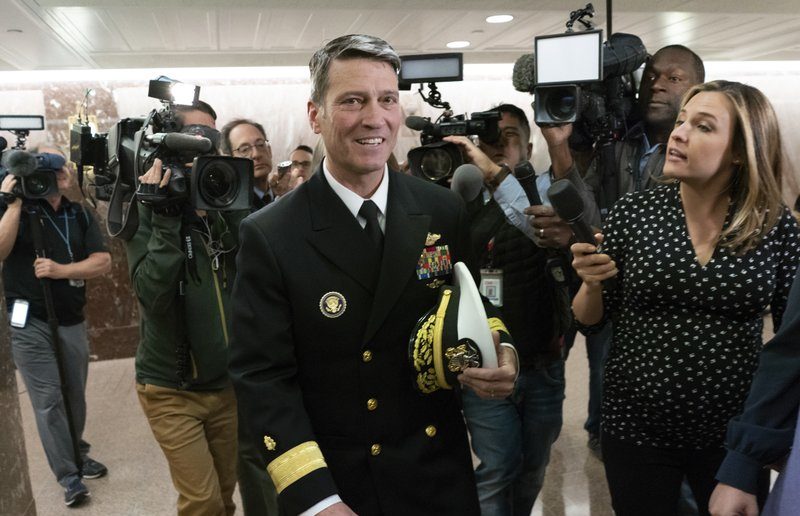
White House doctor Ronny Jackson exhibited a pattern of recklessly prescribing drugs and drunken behavior, including crashing a government vehicle while intoxicated and doling out such a large supply of a prescription opioid that staffers panicked because they thought the drugs were missing, according to accusations compiled by Democratic staff on the committee considering his nomination as Veterans Affairs secretary. The summary was based on conversations with 23 of Jackson’s current and former colleagues at the White House Medical Unit. It is the latest blow to his nomination to lead the government’s second-largest Cabinet agency. In just a matter of days, the allegations have transformed Jackson’s reputation as a celebrated doctor attending the president to an embattled nominee accused of drinking on the job and over-prescribing drugs. He was seen pacing back and forth on the White House grounds Wednesday. And while the White House put on a full-scale defense of Jackson, spokesman Raj Shah said aides are “of course” preparing for the possibility that he might withdraw. “This is, as the president said, Dr. Jackson’s decision,” Shah said on CNN. Jackson huddled late Wednesday evening with top White House press staff. They declined to comment on the situation. A former colleague who spoke to The Associated Press described Jackson as a gregarious, Type A charmer who knew how to position himself for success — attentive to bosses but also causing unnecessary grief and consternation among colleagues. He said Jackson became known as “Candyman” because of the way he handed out drugs. The ex-colleague spoke on condition of anonymity because of fear of retaliation. The “Candyman” nickname was also cited in the summary released by the Democrats. In a section on Jackson’s prescribing practices, the summary said that in one case, missing Percocet tabs threw members of the White House Medical Unit into a panic — but it turned out he had prescribed a “large supply” of the opioid to a White House Military Office staffer. The allegations also referred to multiple incidents of Jackson’s intoxication while on duty, often on overseas trips. On at least one occasion he was nowhere to be found when his medical help was needed because “he was passed out drunk in his hotel room,” according to the summary. At a Secret Service going-away party, the summary says, Jackson got drunk and wrecked a government vehicle. Jackson has denied allegations of bad behavior and told reporters at the White House he was “still moving ahead as planned.” “I never wrecked a car,” he said. “I have no idea where that is coming from.” Reports of overprescribing and alcohol-related behavior problems can jeopardize a doctor’s license. Many state medical boards allow doctors to keep their licenses and return to practice if they complete special treatment programs and submit to random urine screens. The allegations were publicly released on the day that Jackson’s confirmation hearing was to have been held. The hearing was postponed indefinitely while the allegations against him are reviewed. “He treated the people above him very, very well. He treated the people below him very, very poorly,” Sen. Jon Tester, the ranking Democrat on the Senate Veterans Affairs Committee, told the AP. “It’s not surprising the people above him think he was doing a really, really good job.” White House Press Secretary Sarah Huckabee Sanders said Wednesday that Jackson had passed “at least four independent background checks” that found “no areas of concern.” “He has received more vetting than most nominees,” she said. Marc Short, the White House legislative director, could not say he was confident the allegations were false. He was “not familiar” with car wreck episode. But Short also suggested Tester was airing the allegations for political gain. “It’s quite unusual for a United States senator to take allegations that have not been fully investigated, but to flaunt them to the national public to suggest he’s the ‘candyman’ I think is outrageous,” Short said. Tester, speaking on MSNBC, acknowledged that not all the allegations had been verified. “Am I 100% rock solid sure that he did this? No,” Tester said. “But I’ve seen a pattern here that continues on and on and on.” Jackson met late at the Capitol with a key Republican on the Veterans Affairs Committee, Sen. Thom Tillis of North Carolina. They discussed a variety of subjects — “some were the allegations” — as well as Jackson’s credentials for the job. “It was just getting through the facts,” Tillis said. Veterans groups are dismayed over the continuing uncertainty at the VA, already beset by infighting over improvements to veterans care. “The American Legion is very concerned about the current lack of permanent leadership,” said Denise Rohan, national commander of The American Legion, the nation’s largest veterans organization. A watchdog report requested in 2012 and reviewed by the AP found that Jackson and a rival physician exhibited “unprofessional behaviors” as they engaged in a power struggle over the White House medical unit. That report by the Navy’s Medical Inspector General found a lack of trust in the leadership and low morale among staff members, who described the working environment as “being caught between parents going through a bitter divorce.” It included no references to improper prescribing of drugs or the use of alcohol, as alleged in the summary compiled by the Senate Democratic staff members. The White House has released handwritten reports from Trump and former President Barack Obama praising Jackson’s leadership and medical care and recommending him for promotion. Trump’s first VA secretary, David Shulkin, was dismissed after an ethics scandal and mounting rebellion within the agency. But Jackson has faced numerous questions from lawmakers and veterans groups about whether he has the experience to manage the department of 360,000 employees serving 9 million veterans. Republished with permission from the Associated Press.
Watchdog report: Failed VA leadership put patients at risk
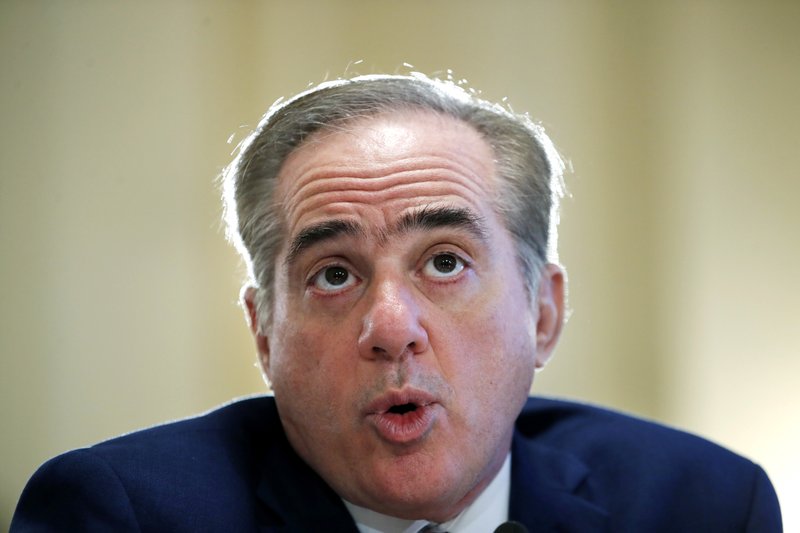
As a top Veterans Administration official in the Obama administration, current Secretary David Shulkin took no action to fix longstanding problems of dirty syringes and equipment shortages that put patients at risk at a major veterans hospital, according to an investigation released Wednesday that finds “failed leadership” and “climate of complacency” at agency. The 150-page report by the VA internal watchdog offers new details to its preliminary finding last April of patient safety issues at the Washington, D.C., medical center. Painting a grim picture of communications breakdowns, chaos and spending waste at the government’s second largest department, the report found that at least three VA program offices directly under Shulkin’s watch knew of “serious, persistent deficiencies” when he was VA undersecretary of health under former President Barack Obama from 2015 to 2016. Shulkin, who was elevated to VA secretary last year by President Donald Trump, told government investigators that he did “not recall” ever being notified of problems. The findings are the latest in a series of problems coming to the light at the VA under Shulkin, who has been struggling to keep a grip on his job since a blistering report by the inspector general last month concluded that he had violated ethics rules by improperly accepting Wimbledon tennis tickets and that his then chief of staff had doctored emails to justify his wife traveling to Europe with him at taxpayer expense. He also faces a rebellion among some VA staff and has issued a sharp warning to them: Get back in line or get out. “I suspect that people are right now making decisions on whether they want to be a part of this team or not,” he said last month. The latest IG investigation found poor accounting procedures leading to taxpayer waste, citing at least $92 million in overpriced medical supplies, along with a threat of data breaches as reams of patients’ sensitive health information sat in 1,300 unsecured boxes. No patient died as a result of the patient safety issues at the Washington facility dating back to at least 2013, which resulted in costly hospitalizations, “prolonged or unnecessary anesthesia” while medical staff scrambled to find needed equipment at the last minute as well as delays and cancellations of medical procedures. The report also noted improvements made at the Washington facility since the IG’s first report in April, when Shulkin replaced the medical center’s director and pledged broader improvements. Still, VA inspector general Michael Missal cautioned of potential problems without stronger oversight across the VA network of more than 1,700 facilities. “Failed leadership at multiple levels within VA put patients and assets at the DC VA Medical Center at unnecessary risk and resulted in a breakdown of core services,” Missal said. “It created a climate of complacency … That there was no finding of patient harm was largely due to the efforts of many dedicated health care providers that overcame service deficiencies to ensure patients received needed care.” In the report, Shulkin responded that he had expected issues involving patient harm or operational deficiencies to be raised through the “usual” communication process, originating from the local level and regional office to VA headquarters in Washington — and that it apparently didn’t happen. While the IG did not make specific conclusions on whether Shulkin actually was warned by direct subordinates, it broadly faulted an “unwillingness or inability of leaders to take responsibility for the effectiveness of their programs and operations,” and cited a “sense of futility” at multiple levels in bringing about improvements. In its written response to Wednesday’s report, the department generally agreed to implement recommendations for improved health procedures at the Washington facility and pledged a “reliable pathway” for local VA and regional officials to report high-priority concerns to senior leadership at VA headquarters. “It was difficult to pinpoint precisely how the conditions described in this report could have persisted at the medical center for so many years,” Missal wrote. “Senior leaders at all levels had a responsibility to ensure that patients were not placed at risk,” he said. Shulkin has maintained White House support despite the travel controversy. He has acknowledged some mistakes in the handling of the trip and said he relied too much on the judgment of his staff to ensure full compliance with travel policies. He has since said he reimbursed the $4,000 plane ticket for his wife. His chief of staff, Vivieca Wright Simpson, has left the agency. Several major veterans organizations are standing behind him as the best guardian of the VA amid a planned overhaul of the Veterans Choice program, a Trump campaign priority aimed at expanding private care outside the VA system. Major veterans groups are wary of an aggressive Choice expansion as a potential threat to the viability of VA medical centers, which it sees as best-suited to treat battlefield injury such as post-traumatic stress disorder. Republished with permission from the Associated Press.
John McCain demands accounting from VA on money for private care
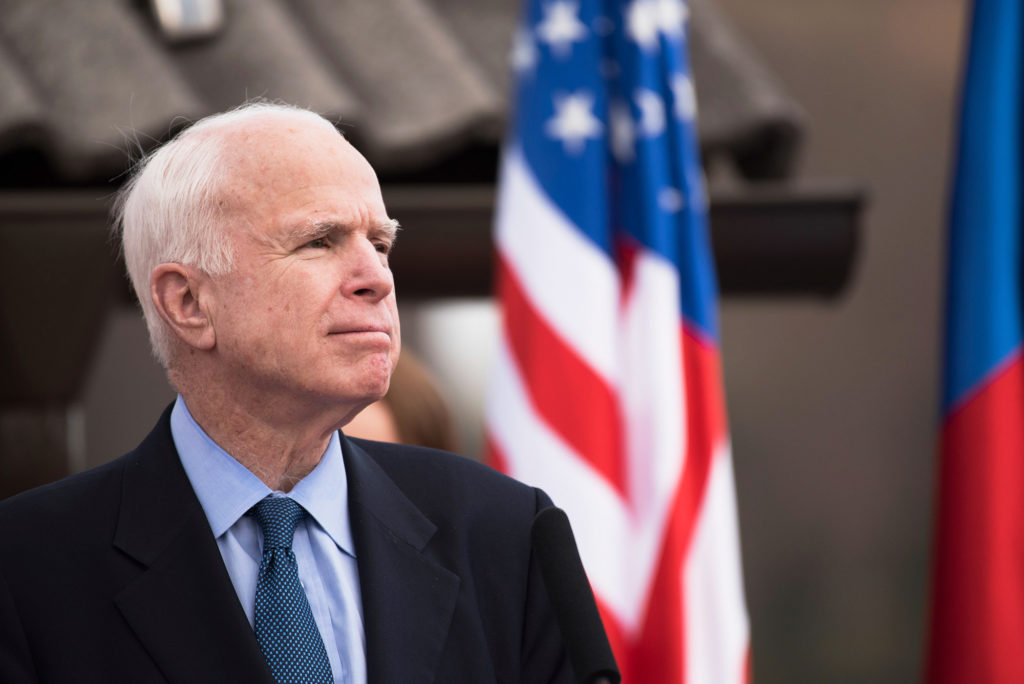
Sen. John McCain is demanding a full accounting from the Department of Veterans Affairs on the financial status of its private-sector health care program after the agency said it could face another budget shortfall as soon as December. The Associated Press reported this week that the VA had acknowledged its Veterans Choice program could run out of money by year’s end despite receiving $2.1 billion in emergency funding just last month. Another shortfall could force the VA to limit referrals to outside doctors, causing delays in medical care for hundreds of thousands of veterans. In a letter to VA Secretary David Shulkin, McCain, who chairs the Senate Armed Services Committee, said he wants to know specifically when the VA expects Choice to run out of money. McCain cites AP’s report, which included a statement from VA that Choice funds could be depleted as early as December or as late as March. The letter, sent late Wednesday, calls for a VA response by the end of the week. The Arizona Republican noted that Congress was led astray earlier this year after VA provided false assurances that Choice funds would last until early 2018. After Shulkin admitted to a budget shortfall in June, McCain joined other senators to express concern to VA about possible financial mismanagement. Congress ultimately approved $2.1 billion in emergency spending for Choice that was intended to last until February. “We said at the time that it was essential, given the growing demand for care under the Choice program, that the VA immediately correct the failures that created such a serious shortfall,” McCain wrote. “It appears as if you have not done so.” In its statement earlier this week to AP, the VA said it hoped to move quickly on a proposed long-term legislative fix that would give veterans even wider access to private doctors. The proposal, under review by the White House budget office, would seek money to keep Choice running for much of next year as VA implements wider changes. Earlier this year, the VA began limiting referrals to outside doctors as money started running low. The Choice program was passed by Congress in 2014 in response to a wait-time scandal at the Phoenix VA medical center that spread nationwide. Some veterans died while waiting months for appointments as VA employees manipulated records to hide delays. The controversy spurred Congress to establish Choice as a pilot program to relieve pressure at VA hospitals. Republished with permission from the Associated Press.
VA seeks to funnel more nursing home money to rural areas
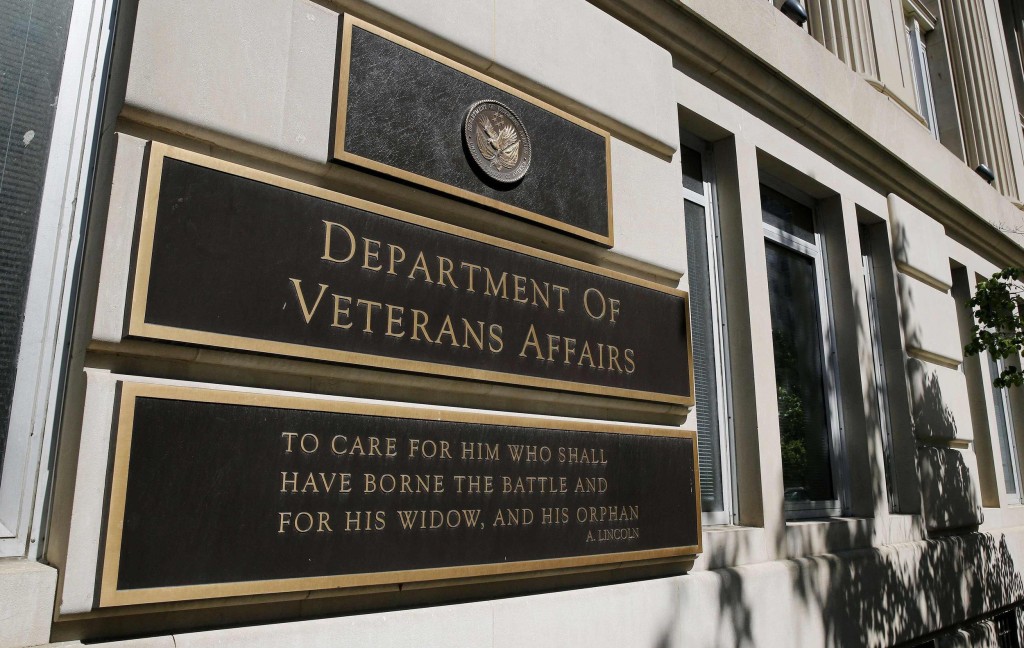
Veterans Affairs Secretary David Shulkin said Monday during a visit to Montana that his agency will propose changes to make it easier for rural areas to receive funding to build nursing homes for veterans. Rural areas are often bypassed under the agency’s existing guidelines for awarding grants for veterans’ homes, Shulkin told reporters after touring VA facilities and meeting with veterans in Helena. “If we don’t change the rules to make sure that being in a rural area increases the likelihood of funding, we’re not going to get to be able to help residents of Montana,” Shulkin said. Montana veterans and lawmakers have been seeking funding for about a decade to build a veterans’ home for the southwestern part of the state. Veterans complain that VA nursing facilities in some parts of Montana are located hundreds of miles away from their homes and families. This year, the proposed veterans’ home for Butte ranked 57th on the agency’s priority list, and the VA only funded the top 13, Shulkin said. The VA now sets its priority list by looking at veteran demographics and the need for beds, making it difficult for some rural areas to compete, VA officials said. The agency plans to propose regulation changes by year’s end to ensure some of the money goes specifically to rural areas. Whatever proposal emerges must go through a public comment period, so it’s unclear when any changes may take effect. Shulkin was in Montana at the invitation of U.S. Sens. Jon Tester and Steve Daines. The three appeared at a question-and-answer session attended by dozens of veterans, who complained about long wait times to see a doctor, lost or delayed paperwork that stalled treatment, poor customer service and retaliation against whistleblowers. There was also some praise amid the complaints. Anna Chacko, who was in the Army for 25 years, said she now receives immediate callbacks from the medical center at Fort Harrison. Shulkin said that fixing the VA is among the few issues in Washington that hasn’t stalled. “When it comes to veterans issues, there is true bipartisan support,” he said. Republished with permission of The Associated Press.
David Shulkin stresses ‘lot of work to do’ to fix beleaguered VA

Veterans Affairs Secretary David Shulkin warned Wednesday that the VA is “still in critical condition” despite efforts that predate his tenure to reduce wait times for medical appointments and expand opportunities to seek care in the private sector. In a “State of the VA” report, Shulkin, a physician, issued a blunt diagnosis: “There is a lot of work to do.” Veterans can get “same-day” services at medical centers but are still waiting too long – more than 60 days – for new appointments at about 30 locations nationwide. Many primary care centers are understaffed or running out of space. Appeals of disability claims remain backed up with years of wait. Inventory systems at several VA facilities are woefully out of date, and employee accountability is “clearly broken.” Shulkin said the department had about 1,500 disciplinary actions against employees on hold, citing legal requirements that it must wait at least a month before taking action for misconduct. That means people are being paid “for violating our core values,” he said in a 17-page report. “Our veterans and their families have benefited from our early success, but have suffered due to the failures of the past to effect real change,” Shulkin said. Shulkin provided his “top to bottom review” at a critical time. His biggest proposals for revamping the VA – and fulfilling the campaign promises of President Donald Trump – will need to be acted on soon by an increasingly polarized Congress if measures are to be passed by this fall. The wish list includes an accountability bill to make it easier to fire VA employees, expanding the Veterans Choice program of private-sector care and stemming veterans’ suicide. About 20 veterans take their lives each day. “That should be unacceptable to all of us,” Shulkin said at a White House briefing. Other efforts include an overhaul of information technology systems, plans to reduce 400 vacant buildings and 735 underutilized facilities, consolidation at VA headquarters in Washington and partnerships with local governments and the private sector. Shulkin announced that a promised White House hotline for veterans’ complaints should be fully operational by Aug. 15. Testing begins Thursday. The telephone number is (855) 948-2311. During the campaign, Trump promised a 24-hour hotline so veterans’ complaints will not “fall through the cracks.” Shulkin, who served in the Obama administration and was promoted by Trump, described the president as being “deeply engaged” on veteran issues, a subject Trump highlighted during the campaign. He pledged to make the department and its health care system work better for veterans. “His commitment to being involved in veteran issues is one of his top domestic priorities,” Shulkin said at the briefing. “Anything that we need, the White House has been extremely responsive and they are impatient and anxious for us to get on with this.” Trump’s budget plan calls for a 3.7 percent increase in total VA funding, mostly to pay for rising costs of medical care. It specifically calls for $29 billion over the next decade for Choice, which allows veterans to seek outside medical care from private doctors. To cover rising costs, the VA would cap the amount of educational benefits veterans could receive under the GI bill and halt “individual unemployability” benefit payments to out-of-work disabled veterans once they reach age 62. Major veterans’ organizations oppose such cuts, with the American Legion describing the trade-offs as “stealth privatization.” Veterans’ groups worry the Trump administration is seeking to expand Choice to the detriment of core VA programs. Besides Choice, Shulkin said he was seeking to implement another campaign priority: a VA accountability office, established by executive order last month, Shulkin said he still needed the Senate to pass accountability legislation that would give him broader authority, such as lowering the evidentiary standard to fire employees. The Senate is scheduled to vote on the bill June 6. The Associated Press reported this week that federal authorities were investigating dozens of new cases of possible opioid and other drug theft by employees at VA hospitals, a sign the problem isn’t going away after the VA announced “zero tolerance” in February. Since 2009, in only about 3 percent of the reported cases of drug loss or theft have doctors, nurses or pharmacy employees been disciplined. Republished with permission of The Associated Press.
Feds investigate dozens of thefts of opioids, other drugs at VA facilities
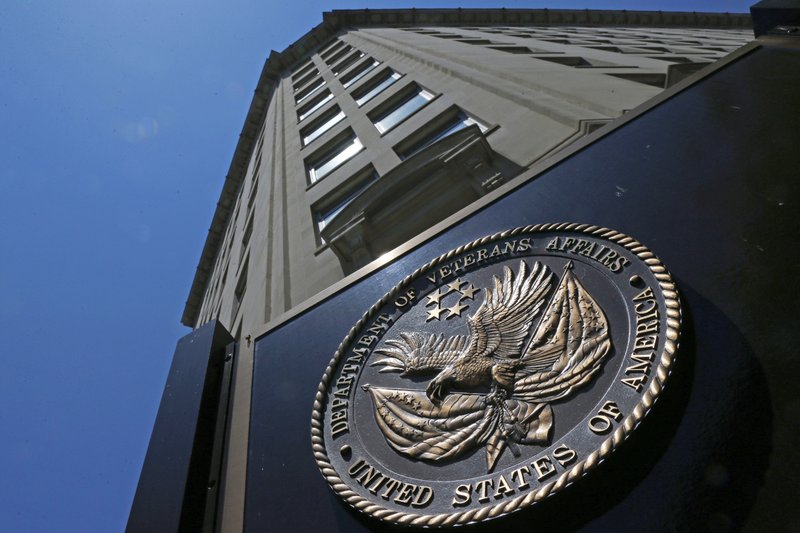
Federal authorities are investigating dozens of new cases of possible opioid and other drug theft by employees at Veterans Affairs hospitals, a sign the problem isn’t going away as more prescriptions disappear. Data obtained by The Associated Press show 36 criminal investigations opened by the VA inspector general’s office from Oct. 1 through May 19. It brings the total number of open criminal cases to 108 involving theft or unauthorized drug use. Most of those probes typically lead to criminal charges. The numbers are an increase from a similar period in the previous year. The VA has pledged “zero tolerance” in drug thefts following an AP story in February about a sharp rise in reported cases of stolen or missing drugs at the VA since 2009. Doctors, nurses or pharmacy staff in the VA’s network of more than 160 medical centers and 1,000 clinics are suspected of siphoning away controlled substances for their own use or street sale – sometimes to the harm of patients – or drugs simply vanished without explanation. Drug thefts are a growing problem at private hospitals as well as the government-run VA as the illegal use of opioids has increased in the United States. But separate data from the Drug Enforcement Administration obtained by the AP under the Freedom of Information Act show the rate of reported missing drugs at VA health facilities was more than double that of the private sector. DEA investigators cited in part a larger quantity of drugs kept in stock at the bigger VA medical centers to treat a higher volume of patients, both outpatient and inpatient, and for distribution of prescriptions by mail. Sen. Marco Rubio, R-Fla., said AP’s findings were “troubling.” He urged Congress to pass bipartisan accountability legislation he was co-sponsoring that would give the agency “the tools needed to dismiss employees engaged in misconduct.” The Senate is set to vote on the bill June 6. “The theft and misuse of prescription drugs, including opioids, by some VA employees is a good example of why we need greater accountability at the VA,” Rubio said. In February, the VA announced efforts to combat drug thefts, including employee drug tests and added inspections. Top VA officials in Washington led by VA Secretary David Shulkin pledged to be more active, holding conference calls with health facilities to develop plans and reviewing data to flag problems. The department said it would consider more internal audits. Criminal investigators said it was hard to say whether new safeguards are helping. “Prescription drug diversion is a multifaceted, egregious health care issue,” said Jeffrey Hughes, the acting VA assistant inspector general for investigations. “Veterans may be denied necessary medications or their proper dosage and medical records may contain false information to hide the diversion, further putting veterans’ health at risk.” Responding, the VA said it was working to develop additional policies “to improve drug safety and reduce drug theft and diversion across the entire health care system.” “We have security protocols in place and will continue to work hard to improve it,” Poonam Alaigh, VA’s acting undersecretary for health, told the AP. In one case, a registered nurse in the Spinal Cord Injury Ward at the VA medical center in Richmond, Virginia, was recently sentenced after admitting to stealing oxycodone tablets and fentanyl patches from VA medication dispensers. The nurse said she would sometimes shortchange the amount of pain medication prescribed to patients, taking the remainder to satisfy her addiction. Hughes cited in particular the risk of patient harm. “Health care providers who divert for personal use may be providing care while under the influence of narcotics,” he said. AP’s story in February had figures documenting the sharp rise in drug thefts at federal hospitals, most of them VA facilities. Subsequently released DEA data provide more specific details of the problem at the VA. Drug losses or theft increased from 237 in 2009 to 2,844 in 2015, before dipping to 2,397 last year. In only about 3 percent of those cases have doctors, nurses or pharmacy employees been disciplined, according to VA data. At private hospitals, reported drug losses or theft also rose – from 2,023 in 2009 to 3,185 in 2015, before falling slightly to 3,154 last year. There is a bigger pool of private U.S. hospitals, at least 4,369, according to the American Hospital Association. That means the rate of drug loss or theft is lower than VA’s. The VA inspector general’s office said it had opened 25 cases in the first half of the budget year that began Oct. 1. That is up from 21 in the same period in 2016. The IG’s office said the number of newly opened criminal probes had previously been declining since 2014. Michael Glavin, an IT specialist at the VA, says he’s heard numerous employee complaints of faulty VA technical systems that track drug inventories, leading to errors and months of delays in identifying when drugs go missing. Prescription drug shipments aren’t always fully inventoried when they arrive at a VA facility, he said, making it difficult to determine if a drug was missing upon arrival or stolen later. “It’s still the same process,” said Glavin, who heads the local union at the VA medical center in Columbia, Missouri. The union’s attorney, Natalie Khawam, says whistleblowers at other VA hospitals have made similar complaints. Criminal investigators stressed the need for a continuing drug prevention effort. The VA points to inventory checks every 72 hours and “double lock and key access” to drugs. It attributes many drug loss cases to reasons other than employee theft, such as drugs lost in transit. But the DEA says some of those cases may be wrongly classified. “Inventories are always an issue as to who’s watching or checking it,” said Tom Prevoznik, a DEA deputy chief of pharmaceutical investigations. “What are the employees doing, and who’s watching them?” Republished with permission of The Associated Press.
VA limiting new hiring as it aims to widen private care

Despite the lifting of a federal hiring freeze, the Department of Veterans Affairs is leaving thousands of positions unfilled, citing the need for a leaner VA as it develops a longer-term plan to allow more veterans to seek medical care in the private sector. The order by VA Secretary David Shulkin is described in an internal April 14 memorandum obtained by The Associated Press. The VA indicated it would proceed with filling open positions previously exempted under the hiring freeze. Noting that the White House had ordered all departments to be leaner and “more accountable,” the VA indicated that more than 4,000 jobs would still be left vacant unless they were specially approved “position by position” by top VA leadership as addressing an “absolute critical need.” These positions include roughly 4,000 in the VA’s health arm and 200 in benefits, plus more than 400 information technology positions and over a 100 human resource positions, according to VA data provided to the Senate Veterans Affairs Committee earlier this month. Government auditors have previously faulted the department for recent shortages in IT and HR, which it said had hurt its ability to recruit and hire key staff department-wide. Major veterans organizations also worry this could be a sign of future tightening at the VA, coming after the department had previously warned it would need “hiring surges” to address a rapidly growing disability backlog. The groups have cautioned against any “privatization” efforts at the VA that could expand private care for veterans while reducing investment in the VA itself. “It seems to be a reversal of what they have been saying, and it’s disappointing,” said Garry Augustine, executive director of Disabled American Veterans’ Washington headquarters. Carlos Fuentes, legislative director of Veterans of Foreign Wars, said his group was concerned the VA would overlook positions that didn’t directly affect health care, such as staffing of its suicide prevention hotline. The VA said in a statement Wednesday that the hiring restrictions were needed to “streamline VA’s corporate structure and administrative positions.” While President Donald Trump‘s budget blueprint calls for a 6 percent increase in VA funding, the memo indicated that the government’s second-largest agency with nearly 370,000 employees was no different from other departments that needed to improve “efficiency, effectiveness and accountability.” It left open the possibility of “near-term” and “long-term workforce reductions.” Shulkin is also putting together a broader proposal by fall to expand the VA’s Choice program of private-sector care. “This memo lifts the federal hiring freeze. However, this does not mean business as usual for hiring,” stated VA chief of staff Vivieca Wright Simpson. She said VA leadership aimed to proceed in the coming months with “deliberative hiring strategies” as it seeks to build “a future VA of Choice.” The memo comes as the Trump administration seeks to highlight accomplishment and accountability at the VA. During the 2016 campaign, Trump repeatedly criticized the VA as “the most corrupt” and pledged to expand private care. Trump planned to sign an executive order Thursday at the VA to create a new Office of Accountability and Whistleblower Protection. The head of the office will report directly to the secretary to help VA officials identify “barriers” that impede the reassignment of employees who are no longer deemed fit to work at the department in the service of veterans, Shulkin said at a White House briefing. Existing employees will staff the office. Shulkin said he didn’t have an exact figure on what the office would cost. Shulkin also has signaled, without naming specific locations, that underutilized VA facilities will have to close. “There are some parts of the country where facilities are sitting empty, and there is no sense in keeping them empty,” he has said. The Republican-led House last month approved legislation to make it easier for the VA to fire, suspend or demote employees for poor performance or bad conduct. But the measure has been slow to move in the Senate after Democrats and unions cast it as an attack on workers’ rights. Republished with permission of the Associated Press.
House passes bill to help VA fill critical job openings with support of entire Alabama delegation
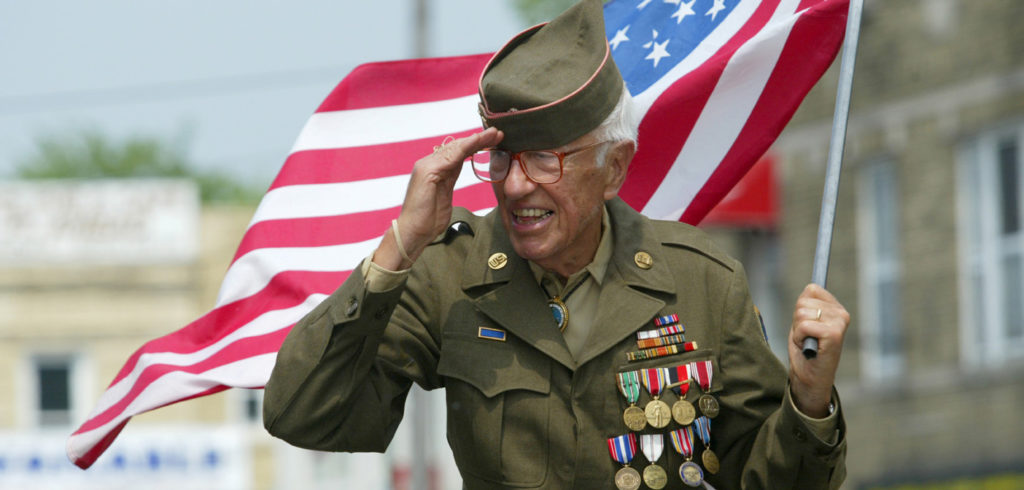
While partisan politics undeniably has its place in the nation’s capital, on Friday members of the U.S. House of Representatives put aside political bickering in order to support an issue everyone agrees on — taking better care of America’s veterans. With the support of the entire Alabama delegation, the House unanimously passed H.R. 1367 in hopes of improving the Department of Veterans Affairs’ (VA) ability to recruit and retain high-quality health care providers and other professionals. The department has tens of thousands of vacant positions, and the bill would help strengthen the VA’s ability to identify staffing shortages, recruit employees to fill vacant positions, quickly on-board new hires, and retain high-performing workers across the country. Additionally, it contains provisions that would improve leadership and accountability throughout VA system, while helping increase the number of veterans in the federal workforce. Also included in the bill, was an amendment added by Alabama-Democrat 7th District U.S. Rep. Terri Sewell. The amendment encourages the VA Secretary to select eligible employees for its Fellowship Program who represent rural areas in order to alleviate the systemic burdens of rural healthcare workforce shortages. “In return for their service, our country has a sacred obligation to care for our veterans and military families,” said Sewell. “Today’s bipartisan support for legislation that strengthens VA hiring practices is an important step towards providing more responsive, more effective healthcare for our nation’s heroes.” Approximately 25 percent of America’s veterans live in rural communities and comprise nearly 11 percent of the adult rural population. Rural veterans account for 36 percent of all VA enrollees, making Sewell’s amendment particularly pertinent. “My amendment helps to ensure that veterans who are serviced by rural VAs have access to healthcare experts with cutting edge experience in the public and private sectors,” Sewell continued. “On top of long driving distances and minimal access to care, workforce shortages make it harder for our rural veterans to get the help they need, when they need it. I want to thank my colleagues on both sides of the aisle for their support, and I look forward to continuing our work to ensure that our nation keeps its promise to the men and women who serve our country.”


